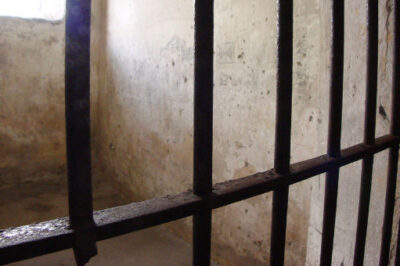Every morning for 35 years, James Bain awoke with the face of injustice staring at him from across his Florida prison cell. He didn’t need a reminder of the years lost to a crime he never committed, yet every day, every hour presented an unrelenting challenge to his one hope—that one day he’d be proven innocent.
As an 18-year-old, Bain had been convicted of kidnapping and raping a 9-year-old boy. An ordinary night in 1974 of watching TV with his sister instantly changed when two officers knocked at the door and asked him to answer a few questions down at the station. With only a few parking tickets in his past, he figured it would take minutes and didn’t even inform his family that he’d left. But a single night in jail turned into decades when he received a life sentence that, despite evidence pointing to his innocence and an unfair trial, was upheld even after numerous appeals.
When Florida’s laws regarding DNA testing changed in 2006, the door finally opened for Bain’s conviction to be argued and his innocence proven. And on Dec. 17, 2009, at 54 years old, he left prison as a free man, exonerated by the state. Bain has every reason to be bitter, yet his response in the face of such injustice is remarkable. “I’m not angry,” he said on the day of his release. “I got God in my head. I knew one day He will reveal me.”
Few of us will ever face a trial like Bain. The injustices we typically deal with pale in comparison, yet too often we act as if we’ve been handed a life sentence by a rigged jury. Instead of trusting in God’s vindication—no matter how big or small the injustice—we take it upon ourselves to fight our accusers and keep a lifelong mental record of those who’ve “done us wrong.”
Scripture guides us on a starkly different path. It’s one Jesus modeled to perfection His entire life, particularly as He faced the greatest injustice in human history: His crucifixion. As we remember Christ’s ultimate sacrifice during Good Friday and Easter this year, keep in mind the following biblical principles—and how Jesus modeled them—on how to respond when you’re blamed for something you didn’t do.
1) Hold your tongue. Our most dangerous body part, the tongue is “a world of evil among the parts of the body” (James 3:6, NIV). Yet when the heat turns up, most of us let our tongues run wild, and the result is a wildfire that destroys us and everyone around. When you’re wrongly accused, don’t lash out in “defense” with your words. Don’t even resort to grumbling, gossiping or complaining. Jesus could’ve silenced His accusers with one word during His arrest and sham trial, yet He bit His tongue. In the face of false accusations, be wise and let others speak on your behalf.
2) Put things in perspective. Step back and ask: Are these accusations really that big of a deal? When I meet persecuted believers from around the world, I’m often struck by how consumed most are with the bigger mission of sharing the Good News. Their suffering is secondary to their kingdom call. Like Jesus, they’re willing to take up their cross for the sake of God’s higher purpose of saving souls. Before reacting with bitterness or anger against your accusers, consider both others’ plight and the divine purposes of your own trial.
3) Turn the other cheek. Jesus’ words in Matthew 5:39 have been part of our language for generations, yet how many of us, when facing unfair accusations, humble ourselves to serve our attackers—even posturing ourselves for more potential assault? Everything in our nature and culture calls this foolishness, yet Christ calls it the way of His kingdom. Why? Because we must also …
4) Understand that vengeance is the Lord’s. God’s sovereignty trumps our limited sense of justice every time. We aren’t the ultimate judge; He is. Because of this foundational principle in life, revenge—if it’s even warranted—isn’t ours to deliver in the first place to those who attack us.
5) Forgive your accusers. Jesus’ words in Luke 23:34 tell it all: “Father, forgive them, for they do not know what they are doing.” Remember, He said this in the very moment of being crucified! If He could forgive those who brought about the worst injustice ever, we can forgive others, whatever the case.
After enduring a night of unjust beatings and verbal assaults, Jesus was asked by Pilate, “Aren’t you going to answer? See how many things [the chief priests] are accusing you of” (Mark 15:4). Christ may have stayed silent with His words then, but His actions still resound throughout all time. He’s empowered us with the Holy Spirit to respond just as He did when we face any kind of injustice. After all, it’s by His blood—not ours—that we overcome.
Marcus Yoars is the editor of Charisma. Follow him on Twitter @marcusyoars or Facebook at facebook.com/marcusyoars.







Leave a Comment
You must be logged in to post a comment.